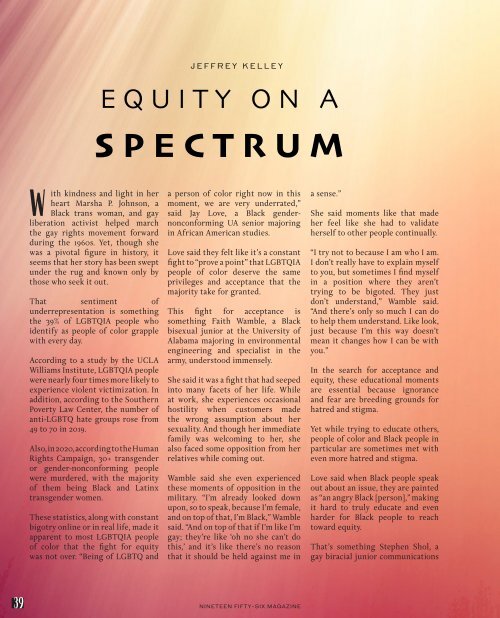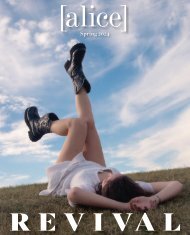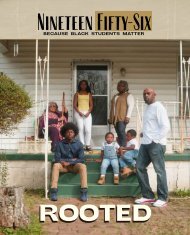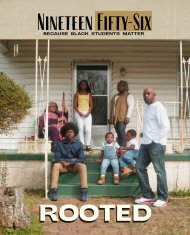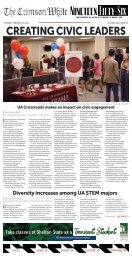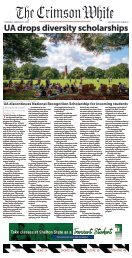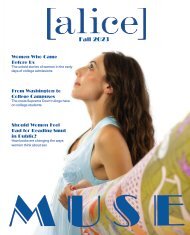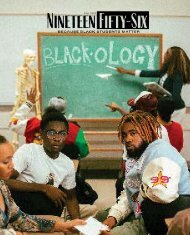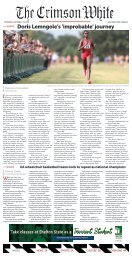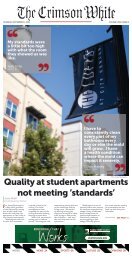Nineteen Fifty-Six Best of 2020-2021 Melanin Magic
This is the first ever print edition of Nineteen Fifty-Six entitled Melanin Magic. This special issue features stories compiled from September 2020 to March 2021.
This is the first ever print edition of Nineteen Fifty-Six entitled Melanin Magic. This special issue features stories compiled from September 2020 to March 2021.
You also want an ePaper? Increase the reach of your titles
YUMPU automatically turns print PDFs into web optimized ePapers that Google loves.
JEFFREY KELLEY<br />
EQUITY ON A<br />
SPECTRUM<br />
W<br />
ith kindness and light in her<br />
heart Marsha P. Johnson, a<br />
Black trans woman, and gay<br />
liberation activist helped march<br />
the gay rights movement forward<br />
during the 1960s. Yet, though she<br />
was a pivotal figure in history, it<br />
seems that her story has been swept<br />
under the rug and known only by<br />
those who seek it out.<br />
That sentiment <strong>of</strong><br />
underrepresentation is something<br />
the 39% <strong>of</strong> LGBTQIA people who<br />
identify as people <strong>of</strong> color grapple<br />
with every day.<br />
According to a study by the UCLA<br />
Williams Institute, LGBTQIA people<br />
were nearly four times more likely to<br />
experience violent victimization. In<br />
addition, according to the Southern<br />
Poverty Law Center, the number <strong>of</strong><br />
anti-LGBTQ hate groups rose from<br />
49 to 70 in 2019.<br />
Also, in <strong>2020</strong>, according to the Human<br />
Rights Campaign, 30+ transgender<br />
or gender-nonconforming people<br />
were murdered, with the majority<br />
<strong>of</strong> them being Black and Latinx<br />
transgender women.<br />
These statistics, along with constant<br />
bigotry online or in real life, made it<br />
apparent to most LGBTQIA people<br />
<strong>of</strong> color that the fight for equity<br />
was not over. “Being <strong>of</strong> LGBTQ and<br />
a person <strong>of</strong> color right now in this<br />
moment, we are very underrated,”<br />
said Jay Love, a Black gendernonconforming<br />
UA senior majoring<br />
in African American studies.<br />
Love said they felt like it’s a constant<br />
fight to “prove a point” that LGBTQIA<br />
people <strong>of</strong> color deserve the same<br />
privileges and acceptance that the<br />
majority take for granted.<br />
This fight for acceptance is<br />
something Faith Wamble, a Black<br />
bisexual junior at the University <strong>of</strong><br />
Alabama majoring in environmental<br />
engineering and specialist in the<br />
army, understood immensely.<br />
She said it was a fight that had seeped<br />
into many facets <strong>of</strong> her life. While<br />
at work, she experiences occasional<br />
hostility when customers made<br />
the wrong assumption about her<br />
sexuality. And though her immediate<br />
family was welcoming to her, she<br />
also faced some opposition from her<br />
relatives while coming out.<br />
Wamble said she even experienced<br />
these moments <strong>of</strong> opposition in the<br />
military. “I’m already looked down<br />
upon, so to speak, because I’m female,<br />
and on top <strong>of</strong> that, I’m Black,” Wamble<br />
said. “And on top <strong>of</strong> that if I’m like I’m<br />
gay; they’re like ‘oh no she can’t do<br />
this,’ and it’s like there’s no reason<br />
that it should be held against me in<br />
a sense.”<br />
She said moments like that made<br />
her feel like she had to validate<br />
herself to other people continually.<br />
“I try not to because I am who I am.<br />
I don’t really have to explain myself<br />
to you, but sometimes I find myself<br />
in a position where they aren’t<br />
trying to be bigoted. They just<br />
don’t understand,” Wamble said.<br />
“And there’s only so much I can do<br />
to help them understand. Like look,<br />
just because I’m this way doesn’t<br />
mean it changes how I can be with<br />
you.”<br />
In the search for acceptance and<br />
equity, these educational moments<br />
are essential because ignorance<br />
and fear are breeding grounds for<br />
hatred and stigma.<br />
Yet while trying to educate others,<br />
people <strong>of</strong> color and Black people in<br />
particular are sometimes met with<br />
even more hatred and stigma.<br />
Love said when Black people speak<br />
out about an issue, they are painted<br />
as “an angry Black [person],” making<br />
it hard to truly educate and even<br />
harder for Black people to reach<br />
toward equity.<br />
That’s something Stephen Shol, a<br />
gay biracial junior communications<br />
39 NINETEEN FIFTY-SIX MAGAZINE


